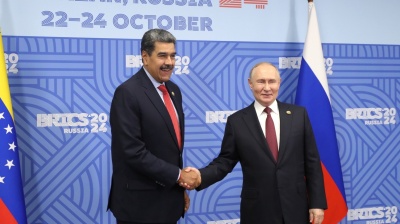Russia has covertly sourced sensitive electronics from India to support its war in Ukraine, Financial Times reported.
According to the report the Russian Ministry of Industry and Trade, which manages military production since the outbreak of the war in Ukraine, outlined plans in October 2022 to spend INR82bn ($1bn) to secure vital components through ‘grey area’ supply chains across the world, in the process bypassing Western sanctions.
Moscow sought to tap into the substantial rupee reserves accumulated from Indian oil sales, targeting India as an alternative market for dual-use technology—goods with both civilian and military applications. The Kremlin considered India a source for components that Russia previously obtained from "unfriendly countries."
Documents referenced by the FT suggest Moscow explored setting up joint Russo-Indian production facilities. However this likely didn’t fit the risk calculus of the local authorities and was almost certainly deemed too risky by any Indian authorities involved.
India’s role as a supplier to Russia and its state entities, despite its close ties to the US, has subsequently raised concerns in Washington.
US Deputy Treasury Secretary Wally Adeyemo warned Indian businesses that transactions with Russia’s military sector could expose them to sanctions. India has significantly expanded its trade with Russia, with bilateral trade reaching $66bn in FY 2023-24, a fivefold increase since the Ukraine invasion.
Much of this trade is settled in Indian rupees, leaving Russia with a currency surplus. Russian entities have utilised these funds to purchase goods and evade sanctions, particularly in the electronics sector.
However despite the vigilance of the US and other sanctioning authorities it is unlikely that this shadowy trade is concentrated in a handful of entities which can be targeted in secondary sanctions. Thus it becomes a ‘whack-a-mole’ situation whereby the illicit actors will always be one step ahead of their pursuers with the country involved turning a blind eye to small entities which appear and disappear based on their relative infamy and signature on the radar of the pursuing international authorities or investigative press.
News

APEC meeting closes in South Korea, WTO dead and buried
This was not a summit. It was a eulogy for the WTO, and APEC just lowered the flag to half-mast.

Turkish state grabs another fintech as company seizures continue at pace
Turkey first seizes companies, then tries the suspects. Some companies are sold before the trial process.

Ukraine’s elite HUR forces turn the tide in the battle for Pokrovsk, as Russia’s effort to capture key logistics hub fails
The battle for Pokrovsk became intense early on November 1and it looked like the fall of the key logistics hub to Russia was imminent. But a bold counterattack by Ukraine’s elite HUR forces seems to have turned the tide.

US prepares attack on Venezuela as Maduro begs Putin for aid
The Trump administration has reportedly drawn up a list of potential military targets within Venezuela as part of its intensifying pressure on President Nicolás Maduro, who has turned to Moscow seeking urgent military assistance.

